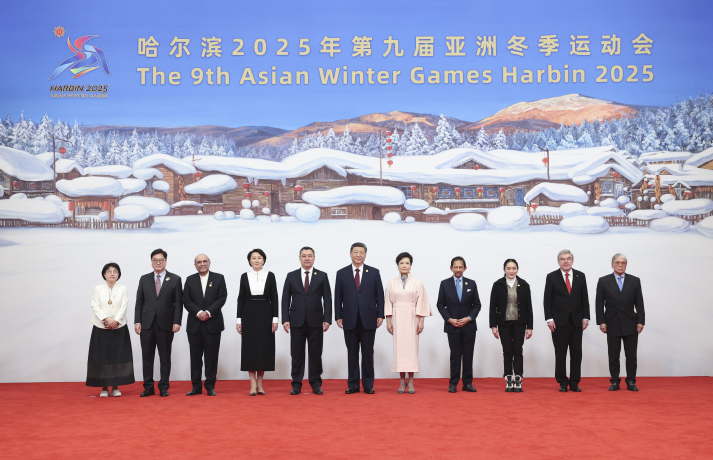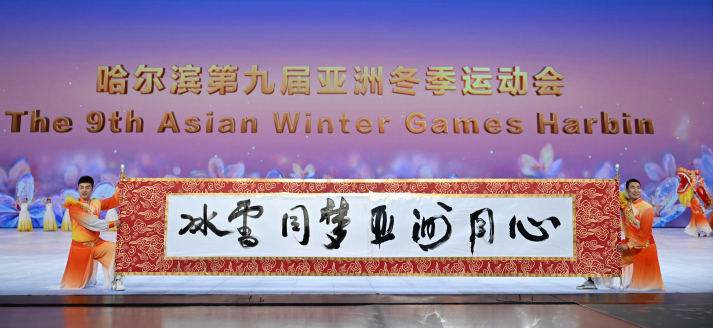| China |
| Through the Asian Winter Games, China calls for peace, development and friendship among Asian peoples | |
|
|
 Chinese President Xi Jinping and his wife Peng Liyuan pose for a group photo with international dignitaries attending the opening ceremony of the Ninth Asian Winter Games in Harbin, Heilongjiang Province, on February 7 (XINHUA)
The Ninth Asian Winter Games (AWG), running from February 7 to 14 in Harbin, Heilongjiang Province, was the first international winter sports event hosted by China since the Beijing 2022 Olympic Winter Games. Over 1,200 athletes from 34 countries and regions across Asia, including first-time participants Cambodia and Saudi Arabia, competed in 64 events at the games, making this edition the largest in terms of participating delegations and athletes. But its significance went beyond athletic competition. The AWG also serves as a platform for engagement and exchange, Gao Fei, Assistant President of China Foreign Affairs University, told China Newsweek magazine. Intensive diplomacy Before attending the opening ceremony of the games on January 7, Chinese President Xi Jinping and his wife Peng Liyuan hosted a welcome banquet for international dignitaries attending the ceremony in Harbin. Those present included the Sultan of Brunei Haji Hassanal Bolkiah Mu'izzaddin Waddaulah, Kyrgyz President Sadyr Japarov, Pakistani President Asif Ali Zardari, Prime Minister of Thailand Paetongtarn Shinawatra and National Assembly Speaker of the Republic of Korea (ROK) Woo Won-shik. International Olympic Committee President Thomas Bach and Olympic Council of Asia Vice President Timothy Fok Tsun-ting also attended the gathering. Xi told the guests that the theme of the games—"Dream of Winter, Love Among Asia"—embodies the shared aspiration and desire of the people of Asia for "peace, development and friendship." "Peace is as pure as ice and snow," he said, adding that no matter how the international landscape evolves, "We should join hands together to meet all kinds of security challenges and contribute Asian strength to building an equal and orderly multipolar world." Xi called for joint efforts to "promote progress and development," and provide "sustained drive for a universally beneficial and inclusive economic globalization." He also urged to fulfill a shared desire for friendship and affinity. "Asia is a convergence of the world's diverse civilizations. We should promote inclusiveness, coexistence and mutual learning, and contribute more to the development and progress of human civilization." Xi said. Before coming to Harbin, the participating foreign leaders had visited Beijing and met with Chinese leaders on issues of common concern. During Xi's talks with President Zardari on February 5, he emphasized that China is ready to work with Pakistan to uphold the Five Principles of Peaceful Coexistence, resist unilateralism and hegemonic practices, strengthen multilateral coordination and safeguard the common interests of developing countries. In the meeting between Xi and President Japarov that same day, both expressed readiness to jointly build a China-Kyrgyzstan community with a shared future, pursue high-quality Belt and Road cooperation and ensure the success in building the China-Kyrgyzstan-Uzbekistan railway. The Belt and Road Initiative was proposed by China in 2013 to boost connectivity along and beyond the ancient Silk Road routes. When meeting with Prime Minister Paetongtarn on February 6, Xi said China appreciates Thailand's effective measures to crack down on online gambling and telecom fraud, noting the two sides should continue to strengthen law enforcement, security and judicial cooperation, safeguard people's lives and property, maintain the order of exchanges and cooperation among regional countries. Xi had talks with Sultan Hassanal Bolkiah on February 6. Xi said China and Brunei should enhance the synergy between the Belt and Road Initiative and the Wawasan Brunei 2035 National Development Plan, advance the two flagship projects of the Guangxi-Brunei Economic Corridor and the Hengyi petrochemical project, and build the BIMP-EAGA (Brunei Darussalam-Indonesia-Malaysia-Philippines East ASEAN Growth Area) and the New International Land-Sea Trade Corridor, a trade and logistics passage jointly built by provincial-level regions of west China and members of the Association of Southeast Asian Nations (ASEAN), as dual hubs. During his talks with Woo in Harbin on February 7, Xi emphasized the importance of commemorating the 80th anniversary of China's victory in the Chinese People's War of Resistance Against Japanese Aggression (1931-1945) and the 80th anniversary of the ROK's liberation. He expressed his hope for both sides to strengthen economic and trade relations, promote people-to-people exchange and support each other in hosting the Asia-Pacific Economic Cooperation Economic Leaders' Meetings this year and next. Xi also met with Bach in Harbin on February 7. Xi said the Olympic spirit is an important part of human civilization. China will "vigorously develop its sports sector, and move toward the goal of building itself into a country strong in sports and health, which will continuously make new contributions to the cause of international sports."  Artists perform prior to the opening ceremony of the Ninth Asian Winter Games in Harbin, Heilongjiang Province, on February 7 (XINHUA)
Ice and snow fervor From the Olympic Winter Games in Beijing to the Asian Winter Games in Harbin, the passion for ice and snow has swept across the Chinese nation. It has also invigorated winter sports around the world, Xi said at the banquet. "The development in the winter sports in China is just breathtaking," Bach said. "China has more than 300 million people being familiar with winter sports and practicing winter sports," he continued. The games also boosted the international reputation of Harbin. In introducing Harbin and the northeast China region, Xi welcomed all to explore this hospitable, open and inclusive land of black soil, and to trace the path of Chinese modernization. "Harbin, the renowned 'Ice City,' is the birthplace of China's modern winter sports. We truly feel here that ice and snow are as valuable as gold and silver," Xi said. He added that "the ice and snow culture and economy are becoming a new driving force for the high-quality development of Harbin and a new bond linking the city and the world." Since the first AWG in Sapporo, Japan, in 1986, winter sports in Asia have grown rapidly, with countries across the continent, including desert and tropical nations, increasingly involved in these activities. "We are pleased that winter sports have become very popular in Asia, from the north and east to the south and west," Husain Al-Musallam, Director General of the Olympic Council of Asia, told Xinhua News Agency. The development of the AWG showcases the practice of building a community with a shared future for humanity, Ru Xiuying, Director of the Olympic Research Center at Capital University of Physical Education and Sports, told Global Times newspaper. The next AWG will be hosted by Trojena, Saudi Arabia, in 2029, the first time it will take place in West Asia. "The games to be held in Saudi Arabia will increase the popularity of winter sports, which will be one of the main attractions for tourism," Al Musallam noted. (Print Edition Title: Frost and Friendship) Copyedited by G.P. Wilson Comments to liwenhan@cicgamericas.com |
|
||||||||||||||||||||||||||||||
|